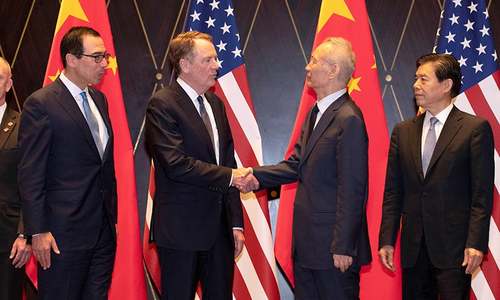LONDON: China’s decision to let its yuan plunge through a previously sacrosanct level means a tit-for-tat trade conflict could morph into a currency war, injecting volatility into long-dormant foreign exchanges and piling pressure on world markets.
Beijing on Monday allowed the yuan to breach the 7 per dollar level for the first time in 11 years, a move seen as a direct response to US President Donald Trump’s escalation of their trade conflict through more tariffs.
China’s willingness to use its currency to offset the impact of a year-long trade dispute is of huge symbolic, if not economic, importance: it shows Beijing is prepared to use its currency as a tool to respond asymmetrically to Trump’s levies.
For global markets, the move opens up a new front that could dramatically raise volatility in the forex market after a prolonged period of calm, especially if it emboldens others to try to weaken their currencies to shield their economies from a global downturn.
“This is the formal introduction of currencies into the trade war,” said Richard Benson, head of portfolio investments at foreign exchange asset manager Millennium Global.
“If anything, it had been currency stability that was used within the trade war. Now this is an overt, explicit move by the Chinese in response to Trump’s tariffs,” Benson added.
Benson said it had become extremely difficult to predict where currencies were headed from here — economic fundamentals told you to buy the dollar, but the risk Trump may hit back encouraged some selling of the greenback.
On Monday, the immediate winners and losers were clear.
The yuan suffered its biggest drop since 2015, although analysts noted that the fall seemed orderly and Chinese authorities comfortable with the move so far.
Steep losses
Elsewhere pretty much any country with a small, open economy tied to globalisation saw its currency plunge. Emerging markets were whacked across the board, with steep losses for instance in the trade-sensitive South Korean won.
The safe-haven Japanese yen surged to a seven-month high below 106 yen per dollar; Goldman Sachs brought forward its forecast of 103 yen to three months.
Japan’s top currency diplomat warned investors Tokyo was ready to intervene if excessive yen gains threatened to hurt its export-reliant economy.
Investors say a more dramatic fallout for markets depends on how the US responded from here. While forex volatility has risen to its highest in four months, it is barely half of 2016 levels.
Trump has a number of levers at his disposal should he try to weaken the dollar, from leaning on the Federal Reserve to lower interest rates to outright unilateral intervention.
On Monday, he tweeted that China’s “currency manipulation” was a “major violation” which would weaken the country over time. He also asked if the Federal Reserve, which he has frequently attacked for not cutting rates, “was listening “?
Highly debatable
Most analysts believe Trump is unlikely to resort to intervention, given this would upend decades of commitment to leave currency markets alone, while the effectiveness of such a move remains highly debatable.
Last month top White House adviser Larry Kudlow said the Trump administration had ruled out intervention, dampening — although not eliminating — market expectations the US would act.
James Binny, State Street Global Advisors’ global head of currency, said an intervention looked more effective as a “threat in the armoury”. If Washington actually intervened it could backfire — given an attempted devaluation that panicked financial markets would send investors to buy the safety of the dollar.
According to Citi analysts, another five per cent or so appreciation in the dollar was necessary before the intervention risk was “live”.
Still, whether or not the US intervenes directly, China’s salvo makes it more likely that countries will increasingly weaponise their currencies in the race to maintain economic competitiveness in a world of slowing growth, fund managers say.
European Central Bank policymakers, for example, have said the strength of the euro is a key reason for signalling more monetary policy easing, sources told Reuters ahead of such a move last month.
The Swiss National Bank appears to be buyin`g foreign currency once again as the trade tensions pushed the value of its safe-haven franc to two-year highs against the euro , currency of its biggest trading partner.
Published in Dawn, August 6th, 2019













































